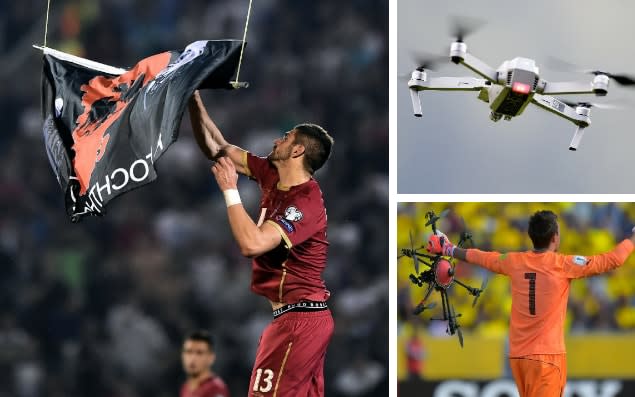Exclusive: Sports venues are at risk of terrorist attacks by drone as organisers are warned of own 'Gatwick moment'

Major sports venues in Britain are as ill-equipped for a drone attack as Gatwick Airport was over Christmas, a Daily Telegraph investigation has found.
Premier League clubs and other event organisers have yet to invest in technology designed to stop a terrorist atrocity or other serious incident, despite it being available before the intrusion that grounded flights for three days at the country’s second-busiest airport.
Those who could afford it were warned last night they could soon face their own “Gatwick moment”, or worse, if they failed to join the airport and Heathrow by purchasing detection, tracking and other countermeasures.
That was after the Telegraph was told that just one of the country’s major outdoor sports facilities had fully adopted such technology, which costs hundreds of thousands to install – the same as some football players are paid each week.
It has also already been used successfully elsewhere, including at last summer’s World Cup in Russia, with the head of the country’s secret service recently announcing it had foiled terrorist plots to use drones to attack supporters there.
As well as being able to launch a bomb or chemical attack, drones pose a risk to the integrity of sport as evidence is emerging that they are being used to obtain an unfair betting advantage.
Of more than two dozen Premier League clubs and major-event organisers contacted, only one confirmed it used anti-drone technology: Silverstone, for the helicopter-laden British Grand Prix weekend.
The others either admitted they had no such technology in place, refused to discuss the matter or failed to respond to questions.
Manchester United said they had trialled anti-drone technology. Arsenal, Tottenham Hotspur and Everton said they had held talks with specialist firms, while Chelsea said they were looking at remedies.
Chris Eaton, former Fifa head of security, warned those in the world’s richest league to improve drone defences or face the consequences. “It may be a matter of time before they face their own Gatwick moment – or worse,” he said.

One sports industry insider described recent Gatwick and Heathrow drone incidents as “a wake-up call for everyone”.
It is illegal to fly a drone without permission within 150 metres of a public gathering of more than 1,000 people and many are programmed by manufacturers to comply with the law.
But either the Gatwick drone was not, or it had its programming compromised, with the authorities unable to locate it during three days that brought misery to hundreds of thousands of passengers.
Gatwick and Heathrow are now spending millions on anti-drone technology, which has the capability to detect, track and, in some cases, disrupt a drone.
The latter intervention is limited to the police and armed forces but that should allow it to be used by officers on duty at most major sporting events.


Two of global sport’s biggest events are being either hosted or co-hosted in the United Kingdom in the next 18 months, football’s European Championship and the Cricket World Cup.
Uefa told the Telegraph its Euro 2020 security policy had yet to be finalised, while cricket World Cup organisers confirmed they had discussed deploying anti-drone technology.
Qualifying for Euro 2016 featured one of sport’s worst incidents when a match between Serbia and Albania was abandoned after a quadcopter carrying a “Greater Albania” flag provoked a riot.
Although a Premier League fixture has yet to be impacted, several Football League matches have been suspended in recent years following drone sightings.
The wide-ranging implication of using drones was also highlighted last week in British racing, which is pressing for action against those accused of streaming images more quickly than broadcasters.
Piracy is another issue, as is spying with Werder Bremen last month using a drone to watch a training session of opponents Hoffenheim.
But it is Gatwick that propelled drones to the top of the agenda, with the Government announcing that police would be given powers to tackle their misuse.
One supplier of counter-drone technology accused the sports industry of having been “unbelievably complacent” about the threat prior to Gatwick, adding: “It took a [significant] event for people to start taking us seriously.”
Richard Gill, chief executive of Drone Defence, told the Telegraph that sports stadiums were his “No 1 priority” for 2019. Gill said his firm could install counter-drone technology at a stadium for £60,000- £300,000 – the latter being a shade more than Paul Pogba’s weekly salary at Manchester United.
Drone Defence is already in trials with at least one Premier League club, although Gill refused to confirm that it was United.
Amit Samani, of rival provider Dedrone, said his firm expected to carry out trials in England’s top flight before the end of the season after doing so in a Six Nations rugby match in the UK last year.
Damian Collins, the chairman of parliament’s Digital, Culture, Media and Sport select committee, said: “The chaos caused at Gatwick Airport should be a wake-up call to major venues across the UK.”

 Yahoo Sport
Yahoo Sport 





































